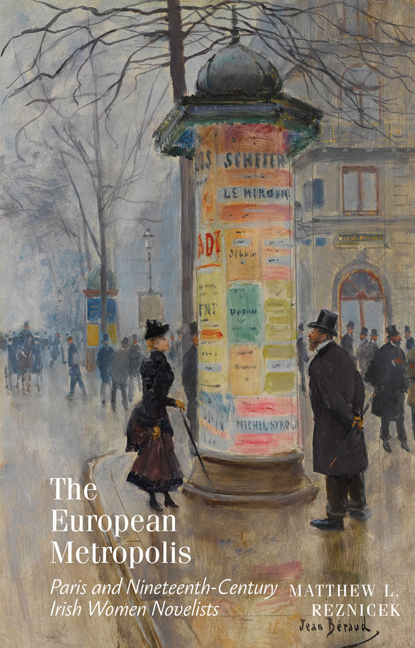Book contents
- Frontmatter
- Contents
- Acknowledgments
- Dedication
- Parvenir: An Introduction
- The Novice in the City: Sydney Owenson and the Bildung of Metropolitan Economics
- Much More than Only Le Bel Irlandois: Metropolitan Socioeconomics and Parisian Bildung in Maria Edgeworth's Ormond
- The New Jerusalem and the Rue Vavin: Urban Space, Economic Exchange, and Gendered Modernity in French Leave
- First Life-and then Fame: Gendered Fin-de-Siècle Cityscapes in Max
- A City She Must Postpone: A Conclusion
- Notes
- Works Cited
- Index
A City She Must Postpone: A Conclusion
- Frontmatter
- Contents
- Acknowledgments
- Dedication
- Parvenir: An Introduction
- The Novice in the City: Sydney Owenson and the Bildung of Metropolitan Economics
- Much More than Only Le Bel Irlandois: Metropolitan Socioeconomics and Parisian Bildung in Maria Edgeworth's Ormond
- The New Jerusalem and the Rue Vavin: Urban Space, Economic Exchange, and Gendered Modernity in French Leave
- First Life-and then Fame: Gendered Fin-de-Siècle Cityscapes in Max
- A City She Must Postpone: A Conclusion
- Notes
- Works Cited
- Index
Summary
Kate O'Brien describes her 1962 travelogue, My Ireland, as “an invitation to travel.” Her novels turn out to be more an invitation to travel than an invitation to stay at home. Rome and Roman locations seem to appear more often than anywhere else in O'Brien's Europe-based, non-historical novels. Rome is mentioned in Without My Cloak (1931), Mary Lavelle (1936), The Flower of May (1953), and As Music and Splendour (1958) nearly 100 times; Paris is mentioned nearly 75 times; while Dublin and London are mentioned 35 and 33 times respectively. These novels thus invite us to relocate them to a European context, or at least into a European landscape and a European map.
Without My Cloak is one of only two Kate O'Brien novels to feature a male protagonist; the other, of course, is Pray for the Wanderer (1938), which itself needs critical attention. This gendered aspect is worth noting, not least because the Bildungsroman is often considered to be an exclusively male genre, or at least one which privileges male development. Without My Cloak is also the novel that appears to adhere most closely to Moretti's model of the classical Bildungsroman; it also embodies what Moretti has described as the “crisis of the European Bildungsroman.” The 1931 James Tait Black Prize-winning novel is a voluminous history of the Considine family as they rise through the ranks of Mellick society from a mere horse thief to a family that runs an international business that stretches across Continental Europe and across the Atlantic; it becomes a Bildungsroman through its focus on Denis Considine, the heir apparent of the Considine estate. Denis, from a young child, is the great hope of the Considine clan and he appears to achieve maturity when he accedes to the Goethean position of married bliss in his family's stately home. As we will see momentarily, this is hardly an Irish Wilhelm Meister. Denis celebrates his eighteenth birthday in Antwerp as part of “a long business tour [that includes] London, Paris, Bordeaux, Marseilles, Paris again, then Antwerp and Amsterdam and Haarlem, then Hamburg and Copenhagen, then Brussels, then Antwerp again, then London, then home.”
- Type
- Chapter
- Information
- The European MetropolisParis and Nineteenth-Century Irish Women Novelists, pp. 181 - 188Publisher: Liverpool University PressPrint publication year: 2017



